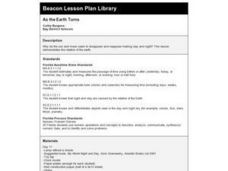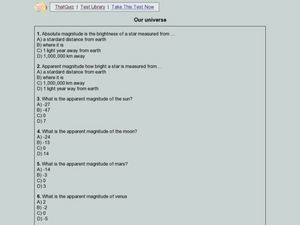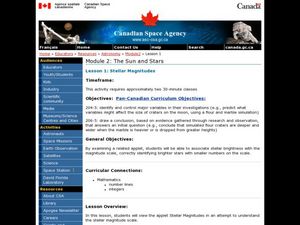Curated OER
Sky Watchers: Ancient Astronomers
Middle schoolers close their eyes and picture the sky. They are asked to brainstorm things they may see in the course of a night and day, such as the movement of the sun, moon, and stars. Students work in groups to coduct their...
Curated OER
The Starry Night Time and Day Time
Second graders complete a unit of lessons on the solar system. They complete various art projects inspired by Van Gogh's 'Starry Night,' create a moon phases book, create a moon phase wind chime, develop a timeline of space exploration,...
Curated OER
Our Solar System
Students study the Earth and Solar System through a variety of activities. They compile a coloring book show the characteristics of the Sun and nine planets.
Mr. E. Science
Our Solar System
The presentation starts with the scientists who made discoveries about our solar system: Ptolemy, Copernicus, Galileo, Brahe, Kepler, and Newton. It also covers the planets, inner, outer, and Pluto, satellites, and an in-depth discussion...
Curated OER
Regents High School Examination: Physical Setting Earth Science 2009
Junior geologists address 50 multiple choice questions and 35 short answer questions about the earth system. Plenty of visuals are included for interpretation: diagrams, graphs, maps, photographs, laboratory setups, weather symbols, and...
Curated OER
The Path of the Sun, the Ecliptic
Students are introduced to the ecliptic, the zodiac and the apparent motions of the Sun, Moon and planets across the sky.
Curated OER
Finding the Pole Star
Students study the constellations fo the Big Dipper and Cassiopeia and their use in finding the Pole Star. They realize that other celestial objects--Sun, Moon and planets--share the rotation (and hence rise and set), even though their...
Curated OER
Exploring the Night Sky: Fall/Winter
Pupils explain how moon phases occur. They explain three ways that the night sky has been used through history. Students locate some of the constellations in the night sky. They discuss stories and myths surrounding stars.
Curated OER
Night Sky
Students discover why stars can only be seen at night. They participate in a read aloud of, "Night Sky" by Carole Stott and, "Switch on the Night" by Ray Bradbury. Using the sky objects described in the readings, they brainstorm and list...
Curated OER
Let's Think About Day and Night
Students explore day and night and the relationships between the Earth, the sun and the moon. They discuss the ways in which the sun and moon help us. They watch a short video that helps illustrate these concepts.
Curated OER
Astronomy
Students complete a unit of lessons on our solar system, its stars, and astronomers. They record information in a space journal, design constellations, define key vocabulary, observe the phases of the moon, and create a group planet...
Curated OER
What's Up? Astronomy Curriculum
Students study astronomy. In preparation for a field trip to a planetarium, students discuss the stars, planets, and light. They explore the importance of the north star and constellations. The Digitarium system is used to assist the...
Curated OER
What's Up?
Students compare and contrast the various heavenly bodies found in the sky at night. They identify the moon and stars in the sky as well as how the stars form pictures called constellations. Students also experiment with reflection and...
Curated OER
Heavens Above
Students study the stars and their positions. In this astronomy lesson plan students see how scientists can predict the positions of the stars and can tell how they would have appeared in the past.
Curated OER
Scale Model of the Solar System
Students work in groups of 4-6 for the experiment/activity part of this exercise. Students know that earth is the third planet from the sun in a system that includes the moon, the sun, eight other planets and their moons, and smaller...
Curated OER
As the Earth Turns
First graders explore why the sun and moon seems to disappear and reappear creating day and night.
Curated OER
Our universe
In this quiz, students are asked 20 questions about the magnitude of planets and stars both in and out of our Solar System. An answer key is provided.
Curated OER
The Night Sky
Third graders develop questions they have about the solar system. After being read a book, they view and discuss different constellations in the sky. In groups, they are given a piece of butcher paper and glow in the dark crayons in...
Curated OER
Up in the Sky
First graders associate events and objects with day or night. They create a word bank and use is as a reference to create sentences about the sun. They conduct sun-themed experiments and art projects.
Curated OER
Sculpt-a-Planet
Students study the moon and the planets. They create a painted, paper mache moon or planet sculpture.
Curated OER
Stellar Magnitudes
Students analyze the stellar magnitude scale. In this stellar magnitude lesson, students examine the stellar magnitude scale. Students predict the Sun's magnitude from various planets.
Curated OER
Our Sky Clock
Students explore space science by completing a worksheet in class. In this astronomy lesson, students discuss and identify star patterns in the night sky and relate these patterns to the approximate time they appear. Students complete an...
Curated OER
Astronomy Merit Badge
Students explore astronomy through the Starry Night Constellation Adventure software. They print star charts and identify constellations. They sketch the Big Dipper and describe the Milky Way. They list the five most visible planets and...
Curated OER
Celestial Characters
Students read myths and legends about celestial bodies, compare cultural perceptions of celestial personalities, represent "character" of sun, moon, clouds, or stars, and invent their own stories about their chosen celestial characters.

























